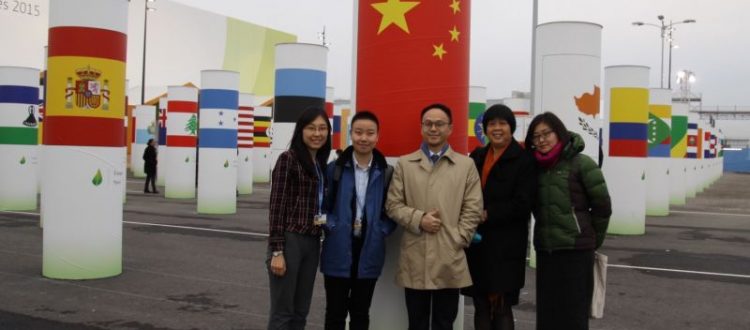GEI’s COP 21 Side Event: China, US and India Discuss Low-Carbon Strategies
PARIS (Dec. 11, 2015) – Global Environmental Institute (GEI) along with National Resource Defense Council (NRDC) and The Energy and Resources Institute (TERI) co-hosted their side-event at the United Nations Framework Convention on Climate Change, 2015 Paris Climate Conference (COP21) yesterday, December 10, 2015.

(from left to right) GEI’s YU Qingchan, JI Lin, XU Shengnian, JIN Jiaman and CAO Sirui together at COP21 in Paris – GEI 2015
The side event was called “Global Climate Action: Perspectives on Major Energy Initiatives in China, India and the United States” and featured each of the three NGOs as well as environmental policy experts from each of the three countries.
“Global Climate Action” was designed to bring together authoritative insights on the three countries that have the most influence on the global climate change. According to World Bank 2014 statistics, China’s, India’s and the US’ combined greenhouse gas (GHG) emissions comprised 50% of total global GHG emissions. For GEI, the event came at a crucial time as Beijing recently endured “Red-Alert” levels of pollution and heightened concern over coal consumption statistics.
The side-event opened with welcome addresses from the respective executive of each NGO, Mr. Jake Schmidt, International Program Director, NRDC; Madame JIN Jiaman, Executive Director, GEI; and Dr. Annapurna V. Vancheswaran, TERI.
Mme JIN Jiaman

Mme JIN Jiaman giving her address – GEI 2015
“China’s, the US’ and India’s individual actions to address climate change are vital to our earth’s sustainability. Moreover, their cooperation is necessary to reach any global greenhouse gas emissions target. This is the spirit of our event and we hope you find the insights shared today both interesting and provocative,” said Madame JIN in her opening address.
The event proceeded with keynote addresses from four invited experts:
Mr. LI Junfeng, Director General, National Climate Change Center for Strategies and International Cooperation, National Development and Reform Commission of China (NDRC); Ms Sonia Medina, Director, Climate Change, The Children’s Investment Fund Foundation (CIFF); Ms Rhea Suh, President, Natural Resources Defense Council (NRDC); and Dr. Ajay Mathur, Director-General, Bureau of Energy Efficiency, Government of India.
These specialists gave insight into particular energy problems facing each country and the strategies implemented.
Notably, two main themes were emphasized across all the speeches: these themes were the need for an energy transformation and the utilization of locally-determined but internationally-analyzed targets.

The side event was full of international experts and cooperation – GEI 2015
How to Achieve an Energy Transformation
Mr. LI Junfeng explained that China is working to realize an energy transformation as a way to address the short term and long term challenges:

Mr. LI Junfeng gives his address – GEI 2015
“China is taking action to reduce coal consumption and increasing renewable energy development so to achieve an energy transformation. Simultaneously, China is also actively engaged in measures for carbon reduction like pollution control as part of green development.”
Dr. YANG Fuqiang, the Senior Adviser on Climate, Energy and Environment for the NRDC China Program, elaborated on the green development measures.

Mr. YANG Fuqiang walks amongst the crowd – GEI 2015
In fact, he said that according to NRDC’s “China Coal Cap Policy” Project, by 2025 China’s renewable energy sources will rival the country’s fossil fuels.
Ms Sonia Medina echoed the need for an energy transformation but through a unique international perspective. She stated that CIFF supports NRDC’s coal control projects in China as well as the development of other renewable energy cooperation undertaken by the Energy Research Institute at the NDRC.
American and Indian Strategies to Meet Targets
The second main theme, locally-determined but internationally-analyzed targets, was particularly highlighted by Ms Rhea Suh and Dr. Ajay Mathur.
- From the American perspective, Ms Suh delved into the American projects surrounding clean energy and the bottom-up strategy of the Clean Power Plan. As she explained, with the approval of the Clean Power Plan, each U.S. state will establish an energy development plan so to efficiently achieve both clean energy development and support the state’s economy.
- Dr. Mathur also spoke on the relevance of addressing local energy needs. In his speech, he explained how India developed and set forth its Intended Nationally Determined Contribution (INDC) for the COP21 conference.
Moving Forward
Impact of American Election on Energy Policy
The side-event concluded with two discussions of energy policy. Participants debated the impact of the next U.S. presidential election on the country’s clean energy policy as well as China’s steps to address the health threats caused by the country’s coal power.
Participants asked the experts what effect the U.S. presidential election will have on climate policy and moreover, what to expect from the House of Representatives and Senate in the upcoming presidential term. Experts’ overall responded that the clean energy plan is supported by many American congressmen and congresswomen.
China’s Pollution Levels
Dr. YANG’s insight on China’s lessening reliance on coal was also extremely relevant in light of Beijing’s recent high pollution levels.
To this end, Dr. YANG said the Chinese government is realizing the great health problems caused by the country’s coal use and is working to actively control it. The event was considered a great success but all parties recognized that, after COP21, an important new chapter of work to achieve low carbon development and cooperation will begin.

